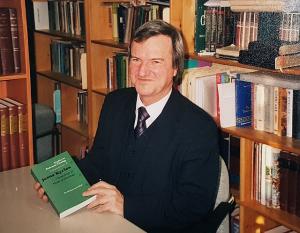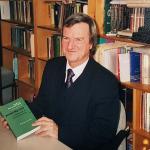How Dynamic Is God?
This is the first installment of a series about the Christian doctrine of God. I will be focusing on one question: How dynamic is God? Let me explain the question.
I was personally shocked to learn, during my theological education, that “classical Christian theism” included belief that God cannot change in any way and cannot be affected by anything outside of himself. This idea of God was and is labeled “aseity.” That is God’s self-sufficiency, independence, immutability and impassibility. It often also includes the idea of God’s meticulous providence, that everything in nature and history is governed, even determined, however indirectly, by an eternal “blueprint” in God’s mind. This was not the idea of God I held in my mind from reading the Bible myself (all through from Genesis to Revelation when I was 10 years old) and it did not fit the image of God I had received from my own Christian tradition. My idea of God was that of a perfect, holy, loving and just person, creator of all and governor of all, judge of all, but merciful and compassionate, and capable of being affected by my prayers. My spiritual formation led me to believe that God could also be grieved and provoked as well as blesssed, made to feel joy and satisfaction by his creatures.
So-called “classical Christian theism” (e.g., Augustine, Boethius, Anselm, Aquinas, even many Protestant scholastic theologians) turned me off when I first learned about it and I determined to investigate it deeply to find out if it was being misrepresented to me. I read books by defenders of classical theism and decided that many of them were inconsistent in their conclusions, diverging from their foundational beliefs about God’s aseity, especially in the matter of prayer. Some, however, were very consistent and denied that prayer could affect God (e.g., Friedrich Schleiermacher).
In middle of my question to understand classical Christian theism and its philosophical foundations, which some have labeled “perfect being ontology,” I took a graduate course in process theology taught by a process theologian. We read and discussed many essays in a massive edited book about process theology edited by process theologian Derwin Brown and we read at least two books by process theologian John Cobb. I decided process theology was as wrong in the opposite direction from classical theism because it robbed God of the ability to act supernaturally and denied any guaranteed future triumph of God over evil.
During my seminary years and into my doctoral studies I explored the possibility of a mediating doctrine of God that would believe and teach God’s profound relationality without denying God’s omnipotence. I wanted a dynamic version of God within orthodox Christianity (belief in the incarnation and Trinity) without the extreme of process theology. Honestly, I wanted a biblically faithful doctrine of God not controlled by either Hellenistic philosophy or panentheism (Hegel and Whitehead).
The first book I found that began to help me was Christian theologian Robert Jenson’s “God After God”—a book about Barth’s theology that went beyond anything Barth himself said or wrote. That book excited and even thrilled me. It launched me further on my question, hopeful that there were other theologians treading the same path toward a truly dynamic God whose immutability meant his faithfulness but not his static aseity. I wrote my dissertation under theologian Wolfhart Pannenberg in Munich (although I had to revise it later, before receiving my Ph.D from Rice University because one of the members of my doctoral dissertation committee despised Pannenberg and insisted that I make my dissertation mainly critical rather than appreciative).
My dissertation was entitled “Trinity and Eschatology: The Historical Being of God in the Theology of Wolfhart Pannenberg.” I never submitted it for publication, but it was given special mention by a committee of the university that examined dissertations for special honors.
Throughout my career as a Christian theologian one question has driven me more than any other and that is the question of God, especially God’s relationality, immutability, impassibility, aseity, etc. I returned to reading Robert Jenson but did not find him to be fully satisfying. I returned to process theology and again was deeply disappointed. I read Barth carefully and books about Barth’s theology and found him enigmatic, sometimes even coy about God’s relationality. I read Moltmann, met and had talks with Moltmann, read Eberhard Juengel and many other Germanic theologians who seemed to be on the same question I was on.
Then I found Dutch theology and began drinking deeply at the wells of modern Dutch theology, especially Berkouwer and Hendrikus Berkhof. I also read Kuitert and American theologians in the Berkouwer-inspired Dutch Reformed tradition such as James Daane at Fuller Seminary and Nicholas Wolterstorff. And, then, also, Adrio Koenig at a university in South Africa whose book “Here Am I: A Believer’s Reflections on God” profoundly affected me. I had the privilege of spending an evening with him at a colleagues’s house and telling him how much I appreciated his book.
Then I found it! One book that satisfied me powerfully. I do not claim that it answered all my questions, but it raised all my questions and attempted to answer them. I felt like it was written FOR ME. I knew it wasn’t, but I devoured it three time! My copy is marked with three colors—from each reading—red, blue and green. It is, unfortunately, a little known book, largely overlooked. I wonder if the title has anything to do with that. I wonder if anyone else, in America, read it and appreciated it as I did and do.
Drum roll…. The book is “Why? On Suffering, Guilt and God” by Dutch theologian Abram van de Beek who taught Christian theology at two Dutch universities and is now retired. I recently exchanged emails with him after my third reading of the book. It is, for me, the best book about the biblical doctrine of God I have ever read, even though it most definitely pushes the envelope of traditional Christian theology. I cannot find any influence of philosophy in Beek’s “doctrine” (not exactly a doctrine) of God. In a way, the book is an essay on theodicy, but there’s so much more to it. Beek interacts with many modern theologians, but his ultimate authority is the Bible. There, in the Bible, he finds an extremely dynamic God who is both omnipotent and good. I won’t say more about his theology here, now.
I was long hesitant to take a stand FOR Beek’s book out of fear of repercussions from my evangelical theological community. It is courageous, risk-taking, controversial, I’m sure. That is, it WOULD BE controversial if conservative theologians read it and understood it.
I very much want to talk about it here, but I know from my blog analytics that whenever I take up “pure theology,” as opposed to ethics, for example, my readership drops dramatically.
But, FOR YOU CO-THEOLOGY NERDS, may I recommend that you get yourselves copies of “Why?” And read it with me. I am willing to go through it a fourth time—that is how valuable I find it. I think it is is still in print, but, if not, there are surely used copies available at book re-sellers online (e.g., aebooks.com).
I will take it slowly and post summaries and reflections on each chapter from time to time and invite responses, but I will appreciate especially responses by people who are reading the book with me. I will intersperse this series with blogs about ethics and other subjects just to keep my readership up 🙂
*Note: If you choose to respond with a comment, be sure it is relatively brief (no more than 100 words), on topic, addressed to me, civil and respectful (not hostile or argumentative), and devoid of pictures or links.*
















